← Back to Reviews
in
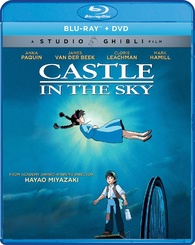
August 2, 1986 (Japan)
April 15, 2003 (United States)
124 minutes
Rated PG for fantasy action violence and peril
1.85:1
Directed by Hayao Miyazaki
Written by Hayao Miyazaki
Produced by Isao Takahata
Characters Designed by Hayao Miyazaki
Music by Joe Hisaishi
Carrying You (Kimi Wo Nosete) performed by Azumi Inoue
Composed by Joe Hisaishi
Lyrics by Hayao Miyazaki
Voice Talent (1998 Disney dub):
Anna Paquin as Sheeta
James Van Der Beek as Pazu
Cloris Leachman as Captain Dola
Mark Hamill as Colonel Muska
Jim Cummings as General Muoro
Richard Dysart as Uncle Pom
Mike McShane as Charles
Mandy Patinkin as Louis
Andy Dick as Henri
John Hostetter as Pazu's Boss
Voice Talent (Japanese):
Keiko Yokozawa as Sheeta
Mayumi Tanaka as Pazu
Kotoe Hatsui as Captain Dola
Minori Terada as Colonel Muska
Ichiro Nagai as General Muoro
Fujio Tokita as Uncle Pom
Takuzo Kamiyama as Charles
Yoshito Yasuhara as Louis
Sukekiyo Kamiyama as Henri
Hiroshi Ito as Pazu's Boss
Some films simply transcend the border of what's on the surface. Legendary Japanese animator Hayao Miyazaki's Castle in the Sky (known as Laputa: Castle in the Sky internationally) is such a film. Miyazaki has crafted a fun and exciting adventure film that also doubles as an emotionally satisfying journey into the human condition, a film that meditates on love, compassion, friendship, selflessness, and what really determines one's worth. The result is my favorite film produced under the Studio Ghibli banner, only bested by Nausicaä of the Valley of the Wind for the top spot as my favorite Miyazaki film and I have no problem saying it's become one of my favorite films in general. Yes, Studio Ghibli's first official film has stood and will continue to stand the test of time for years to come.
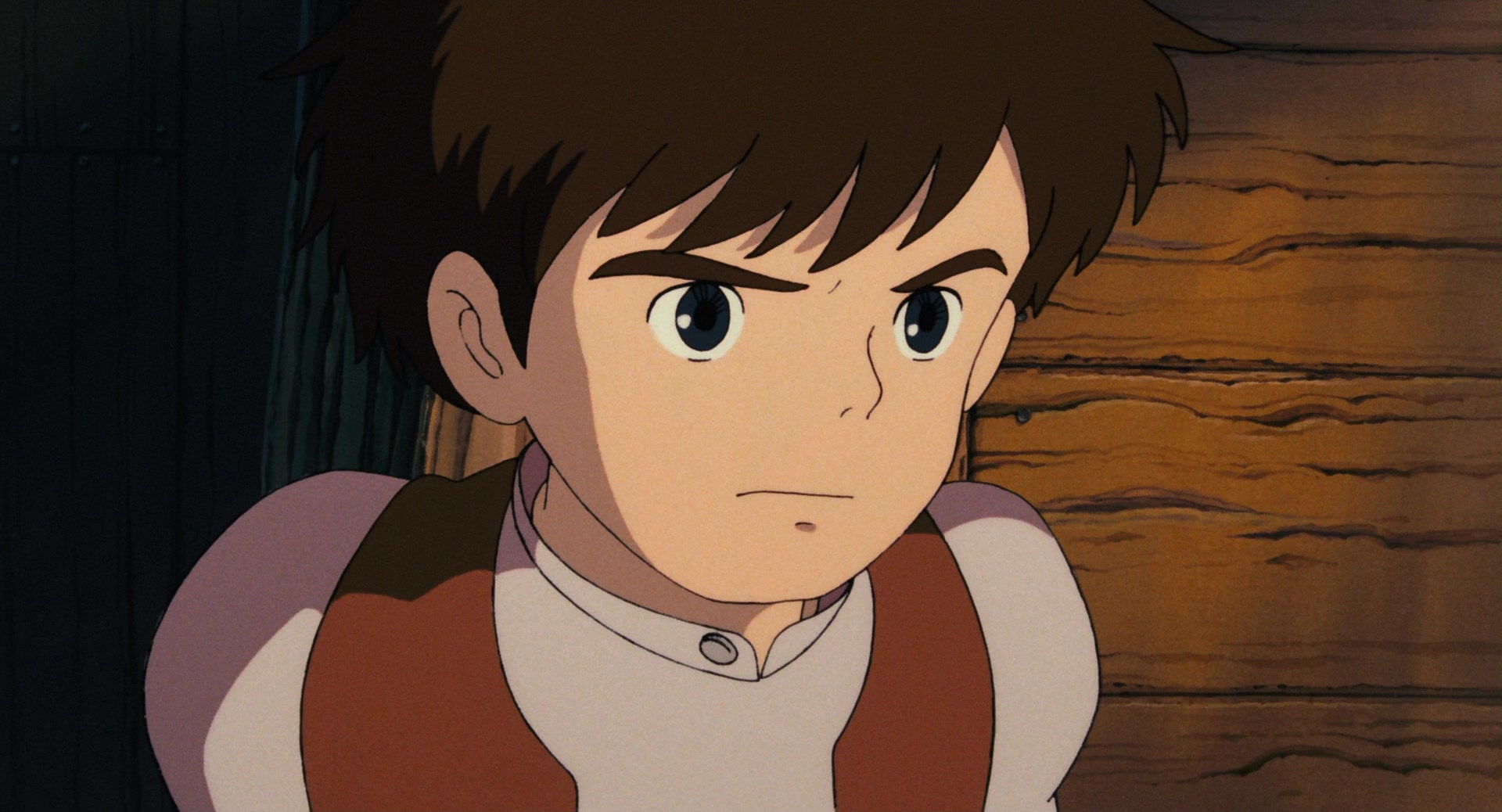
It is the 19th century. While returning to work in a mining village with his boss's dinner one night, 12-year-old engineer's apprentice Pazu (James Van Der Beek in the 1998 Disney dub, Mayumi Tanaka in Japanese) catches a sleeping girl his own age after seeing her float down from the sky, a glowing crystal around her neck keeping her afloat. After getting off from work, Pazu takes the girl to his house where he has lived alone ever since his father passed away while it is unknown what befell his absent mother. When she wakes up the next morning, she reveals herself as Sheeta (Anna Paquin, Keiko Yokozawa) and the two quickly form a bond. When Sheeta notices a framed photo of Laputa, the titular castle which was also visited by Gulliver, Pazu reveals that even though his father took the photo from an airship, no one believed him, but also says that his father was no liar and resolves to prove Laputa's existence. After a chase with pirates who want Sheeta's crystal, where the army (who also wants her crystal) intervenes, Pazu and Sheeta enter the underground caves where Sheeta reveals that after losing her parents, she was abducted from her farm by the army. It is also here that they encounter Uncle Pom (Richard Dysart, Fujio Tokita) who reveals that only the people of Laputa knew how to mine the element Sheeta's crystal is composed of, also stating that it's dangerous to abuse the crystal's power for selfish reasons. Having vowed to find Laputa together, the two are soon ambushed by the army, Pazu is pistol-whipped, and both are taken to a nearby army base. This base is where, in order to advance his ulterior motives, Colonel Muska (Mark Hamill, Minori Terada) coerces Sheeta into cooperating with the promise that they will release Pazu. Sheeta tells Pazu to forget about Laputa, but he can't forget, arguing that Laputa means too much to both of them. Even so, Pazu returns home in despair after a nasty encounter where Muska shoves money into his hand, only to find 60-year-old pirate captain Dola (Cloris Leachman, Kotoe Hatsui) and her boys waiting for him. When they reveal that they're going after Sheeta, Pazu insists he be allowed to rescue her. After Pazu rescues Sheeta, a race against the clock begins as they set out with Dola and the pirates to find Laputa before Muska can enact whatever evil plans he has for the legendary island.

Miyazaki has filled the film's story to the brim with depth, heart, and soul and it serves as 124 of the most worthwhile minutes you'll ever spend watching a film. Pazu and Sheeta have lived alone ever since losing their parents, but after finding each other, it is likely they will never have to be alone ever again, or at least not for very long. The love that grows between them is one of the most beautiful things put on film and perhaps nothing better exhibits its beauty than a scene in the latter half where they keep watch in the late hours of the night. Dola and the pirates show that there is more to a person than what they might initially seem. The friendship that forms between them and the two kids is one that will bring smiles to a whole lot of faces and continue to do so with repeated viewings. Miyazaki also expertly shows how greed and selfishness can corrupt the heart and soul. No character proves this point better than Muska, who is arguably the most evil villain Miyazaki's ever created. His complete lack of compassion has consumed him before the film even opens and he pays the price. Contrast this with Pazu and Sheeta, who don't want any of Laputa's treasures but end up finding the greatest treasure of them all, more precious than any material thing. Material treasures can never match the value of a human being, the value of love, the value of compassion, the value of honor, or the value of friendship. Character traits such as compassion, honor, and selflessness define a person's worth more than money or any other materialistic treasure ever can. Pazu and Sheeta recognize this. The pirates, for as much as they seek treasure, also recognize this and are thousands of times more decent human beings than Muska. Even so, Muska is simply a figurehead for the sinister principles our heroes stand against. We also get to watch as, bit by uplifting bit, Sheeta garners the inner strength to make a pivotal decision that may turn the tide of the battle against evil and we get to see not only her old wounds, but Pazu's as well, finally heal. On top of that, the scene where they finally make it to Laputa is as satisfying a scene as one could ask for and we get an endgame that closes things out perfectly, serving as not only an ending but also a beginning. It may be the end of the search for Laputa, but it is also clearly only the beginning for Pazu and Sheeta, a magnificent end to a magnificent film and one that is, in a way, both triumphant and poignant. There are also subtle bits of depth that reveal themselves with each new watch, making repeat viewings just that much more rewarding.
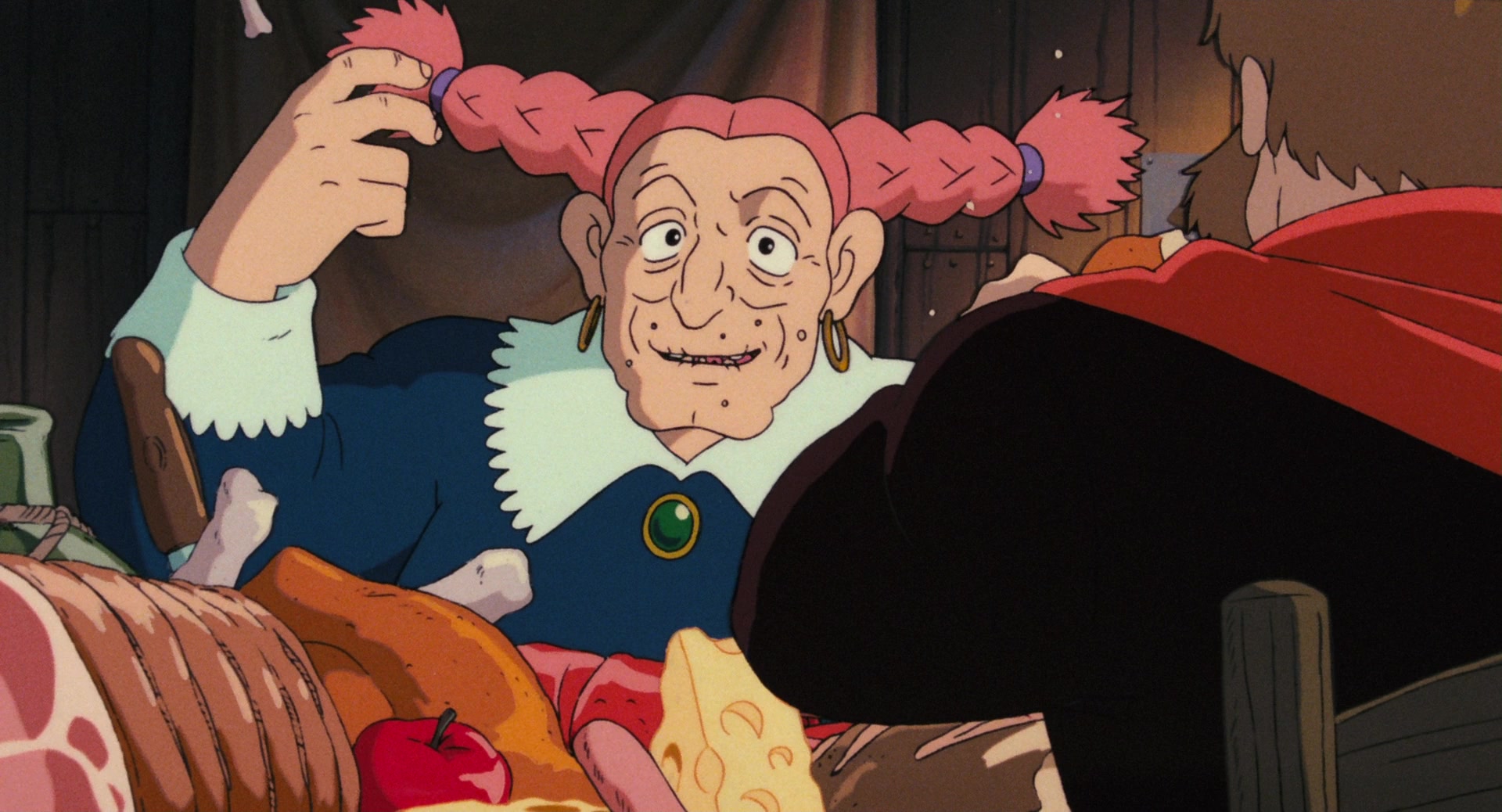
The animation is everything you'd expect from a Miyazaki film. There is an abundance of lush colors, from the blue of the sky to the green of the plants to the red of Sheeta's hairband. Character designs match the proportions of real people and we get the wide array of facial expressions that naturally follow as well as a diverse array of natural skin tones and realistic clothing. Close-ups also reveal interesting details, like the fact that both Pazu and Sheeta have blue eyes. Each background is vastly detailed. The interiors of airships show every nook and cranny you'd expect from a creation of its steampunk nature, Laputa is exactly what you'd expect from a floating city that houses greatly advanced technology, and Pazu's house is as homey as you'd expect while the army base has a fitting calculated coldness and the mines are just as dirty and cavernous as a real one. We also get some cool-looking giant robots and a variety of animals, which are also highly detailed. Miyazaki also pans across various backgrounds to keep the viewer engaged. All of this came off especially well when I saw the film theatrically. Overall, Castle in the Sky couldn't have been animated better.
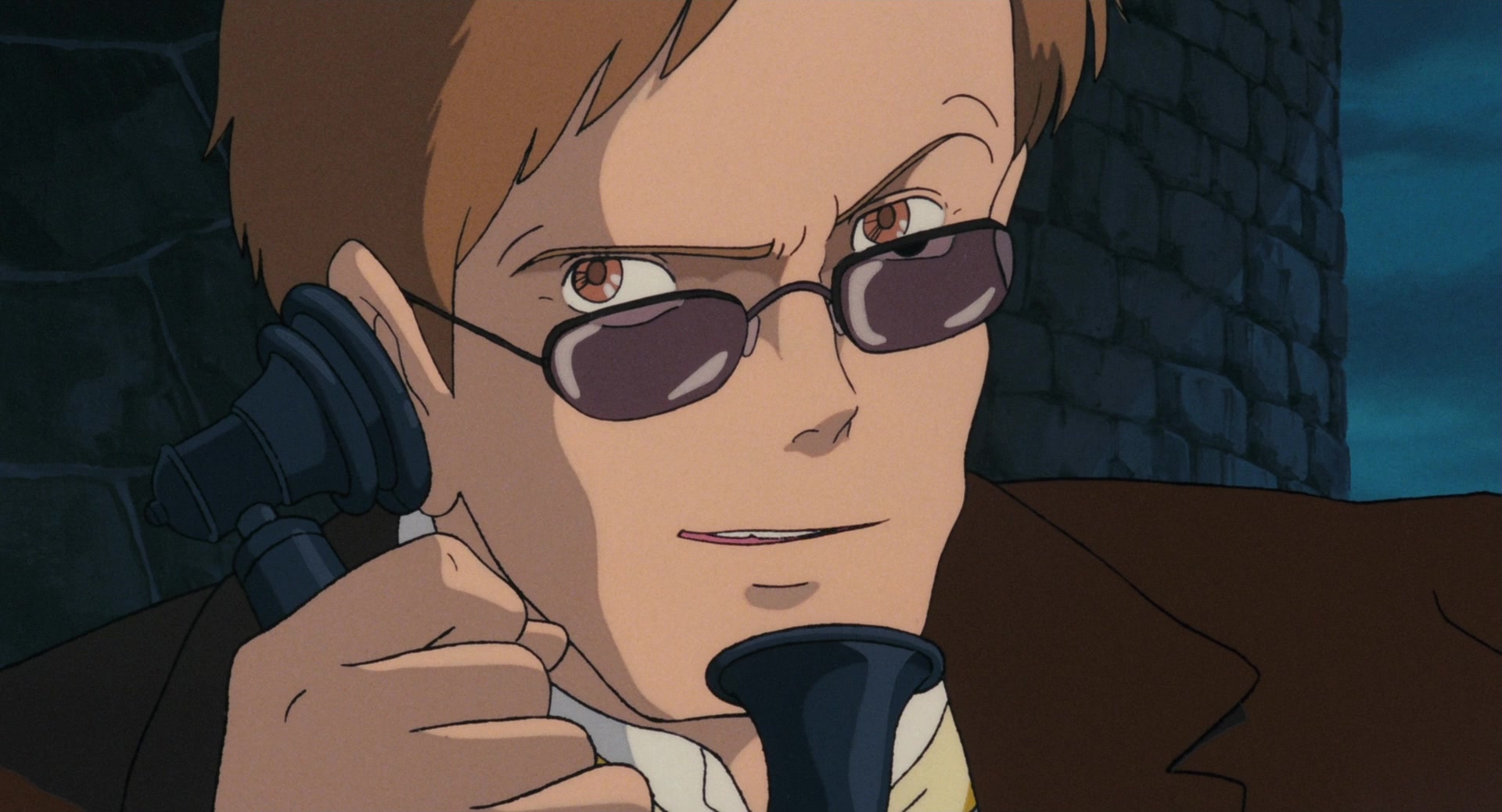
The film is also well-acted and well-scripted in both English and Japanese. Van Der Beek and Tanaka are excellent as Pazu. Some have criticized Van Der Beek for the fact that he was 21 years old when Disney dubbed the film in 1998, but that doesn't come anywhere near stopping him. Van Der Beek gives it his all, imbuing the character with all the enthusiasm and energy a 12-year-old boy would have and also supplements this with a wisdom beyond his years as the film progresses, especially in the latter half when he and Paquin's Sheeta have a conversation about Laputa, the crystal and what its power implicates. Then again, I had a naturally deep voice at that age, so I guess it wouldn't bother me. That said, Tanaka does the same, albeit in a different way. The same is true of Paquin and Yokozawa as Sheeta. Paquin has also been criticized by some who have called her “stilted and unreliable” and accused her of (and I'm paraphrasing) “nearly sending the film's English dub crashing down to Earth,” but I disagree. She starts off somewhat wavering but grows more steady as the film goes along, which is actually a perfect match for the character's transformation as she finds her inner strength. Leachman and Hatsui are also excellent as Dola, encompassing the pirate captain's compassion every bit as much as her gruffness. So are Hamill and Terada as Muska, effectively depicting the character's seared-with-a-hot-iron conscience, selfishness, and altogether despicable nature; Hamill sounds like a colder version of Joker as he voiced him in Batman: The Animated Series, but it actually works a lot better for Muska than you might initially think. This is also true for the rest of the two casts. All in all, both are full of life, character depth, and purpose and you can't go wrong with either. If you want my advice, watch it both dubbed and subbed and enjoy both for what they bring to the table.
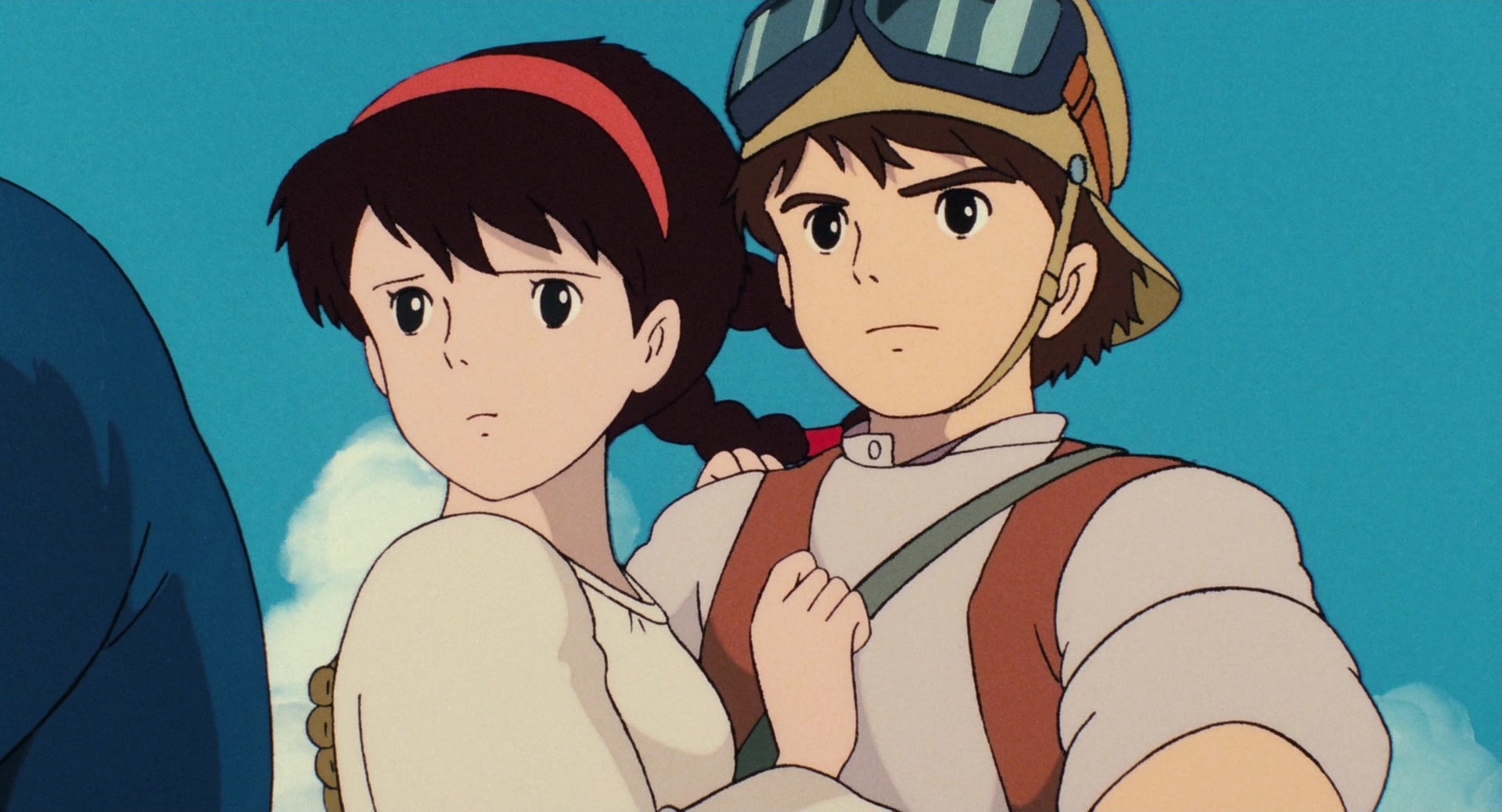
Joe Hisaishi is a master at musical scoring and he gives one of his best here. Or should I say two of his best since he composed an expanded score for the dub that Miyazaki himself approved? The expanded score actually works together with the excellent voice acting to tip me in favor of the dub. I know, some have claimed the expanded score adds nothing to the experience, but I don't think that's the case. The expanded score serves for a more complete and immersive film. Simply compare the opening minutes with and without Prologue/Flaptors Attack and the two versions of The Girl Who Fell From the Sky that play over the film's opening credits and you'll find that the expanded score is more nuanced. In the morning when Sheeta wakes up, Pazu's Fanfare is also more nuanced in the expanded score where it is more electronic and repetitive in the original score. If I had to name one of my favorite tracks from the expanded score, it's Confessions in the Moonlight which plays when Pazu and Sheeta keep watch, perfectly encapsulating the scene's warmhearted tone. Comparing the film's endgame, the expanded score is more nuanced and complete; the scene where a certain spell is uttered is accompanied by a hauntingly beautiful chanting piece that gives this fan goosebumps every single time he watches the film dubbed. Like the animation, the expanded score is another thing I couldn't help noticing yet again when seeing the film theatrically. With that said, the original synthesizer score is really good for what it is considering what Hisaishi had access to and I'll admit I probably wouldn't be saying any of these things if the expanded score didn't exist. Still, though, the expanded score is a magnificent score for a magnificent English dub of a magnificent film. One thing that remains the same is Azumi Inoue's Carrying You (Kimi wo Nosete) playing over the closing credits. It's basically The Girl Who Fell From the Sky with lyrics Miyazaki himself wrote, but it's a perfect note to end the film on and when you look up the English translation, it turns out that it flawlessly matches what the movie is all about. Throw in an amazing sound design and Castle in the Sky does everything right.

In case it wasn't already obvious, I love Castle in the Sky. As far as I'm concerned, it's Studio Ghibli's finest hour, one of Miyazaki's finest, and one of the best films of the 1980s. I've seen the film in the theater and several more times on Blu-ray and it never ceases to impress me in every possible way. The film is not only a fun and exciting adventure but an emotionally satisfying look at love, honor, compassion, friendship, selflessness, and the triumph of the human spirit. The film is also visually stunning and the various chase scenes continue to thrill with each new watch. Its most likable characters are easy to become invested in all over again and its story is all too easy to find oneself swept along in as if seeing the film for the first time. Pazu and Sheeta's battle against evil remains as compelling as ever. The bond that forms between them will remain etched within your subconscious for ages and both of Hisaishi's scores, especially the expanded score, as well as Inoue's theme song will ring inside your ears long after the credits roll. Oh, yes, Castle in the Sky earns my highest recommendation.

August 2, 1986 (Japan)
April 15, 2003 (United States)
124 minutes
Rated PG for fantasy action violence and peril
1.85:1
Directed by Hayao Miyazaki
Written by Hayao Miyazaki
Produced by Isao Takahata
Characters Designed by Hayao Miyazaki
Music by Joe Hisaishi
Carrying You (Kimi Wo Nosete) performed by Azumi Inoue
Composed by Joe Hisaishi
Lyrics by Hayao Miyazaki
Voice Talent (1998 Disney dub):
Anna Paquin as Sheeta
James Van Der Beek as Pazu
Cloris Leachman as Captain Dola
Mark Hamill as Colonel Muska
Jim Cummings as General Muoro
Richard Dysart as Uncle Pom
Mike McShane as Charles
Mandy Patinkin as Louis
Andy Dick as Henri
John Hostetter as Pazu's Boss
Voice Talent (Japanese):
Keiko Yokozawa as Sheeta
Mayumi Tanaka as Pazu
Kotoe Hatsui as Captain Dola
Minori Terada as Colonel Muska
Ichiro Nagai as General Muoro
Fujio Tokita as Uncle Pom
Takuzo Kamiyama as Charles
Yoshito Yasuhara as Louis
Sukekiyo Kamiyama as Henri
Hiroshi Ito as Pazu's Boss
Still one of Miyazaki's best
Some films simply transcend the border of what's on the surface. Legendary Japanese animator Hayao Miyazaki's Castle in the Sky (known as Laputa: Castle in the Sky internationally) is such a film. Miyazaki has crafted a fun and exciting adventure film that also doubles as an emotionally satisfying journey into the human condition, a film that meditates on love, compassion, friendship, selflessness, and what really determines one's worth. The result is my favorite film produced under the Studio Ghibli banner, only bested by Nausicaä of the Valley of the Wind for the top spot as my favorite Miyazaki film and I have no problem saying it's become one of my favorite films in general. Yes, Studio Ghibli's first official film has stood and will continue to stand the test of time for years to come.

It is the 19th century. While returning to work in a mining village with his boss's dinner one night, 12-year-old engineer's apprentice Pazu (James Van Der Beek in the 1998 Disney dub, Mayumi Tanaka in Japanese) catches a sleeping girl his own age after seeing her float down from the sky, a glowing crystal around her neck keeping her afloat. After getting off from work, Pazu takes the girl to his house where he has lived alone ever since his father passed away while it is unknown what befell his absent mother. When she wakes up the next morning, she reveals herself as Sheeta (Anna Paquin, Keiko Yokozawa) and the two quickly form a bond. When Sheeta notices a framed photo of Laputa, the titular castle which was also visited by Gulliver, Pazu reveals that even though his father took the photo from an airship, no one believed him, but also says that his father was no liar and resolves to prove Laputa's existence. After a chase with pirates who want Sheeta's crystal, where the army (who also wants her crystal) intervenes, Pazu and Sheeta enter the underground caves where Sheeta reveals that after losing her parents, she was abducted from her farm by the army. It is also here that they encounter Uncle Pom (Richard Dysart, Fujio Tokita) who reveals that only the people of Laputa knew how to mine the element Sheeta's crystal is composed of, also stating that it's dangerous to abuse the crystal's power for selfish reasons. Having vowed to find Laputa together, the two are soon ambushed by the army, Pazu is pistol-whipped, and both are taken to a nearby army base. This base is where, in order to advance his ulterior motives, Colonel Muska (Mark Hamill, Minori Terada) coerces Sheeta into cooperating with the promise that they will release Pazu. Sheeta tells Pazu to forget about Laputa, but he can't forget, arguing that Laputa means too much to both of them. Even so, Pazu returns home in despair after a nasty encounter where Muska shoves money into his hand, only to find 60-year-old pirate captain Dola (Cloris Leachman, Kotoe Hatsui) and her boys waiting for him. When they reveal that they're going after Sheeta, Pazu insists he be allowed to rescue her. After Pazu rescues Sheeta, a race against the clock begins as they set out with Dola and the pirates to find Laputa before Muska can enact whatever evil plans he has for the legendary island.

Miyazaki has filled the film's story to the brim with depth, heart, and soul and it serves as 124 of the most worthwhile minutes you'll ever spend watching a film. Pazu and Sheeta have lived alone ever since losing their parents, but after finding each other, it is likely they will never have to be alone ever again, or at least not for very long. The love that grows between them is one of the most beautiful things put on film and perhaps nothing better exhibits its beauty than a scene in the latter half where they keep watch in the late hours of the night. Dola and the pirates show that there is more to a person than what they might initially seem. The friendship that forms between them and the two kids is one that will bring smiles to a whole lot of faces and continue to do so with repeated viewings. Miyazaki also expertly shows how greed and selfishness can corrupt the heart and soul. No character proves this point better than Muska, who is arguably the most evil villain Miyazaki's ever created. His complete lack of compassion has consumed him before the film even opens and he pays the price. Contrast this with Pazu and Sheeta, who don't want any of Laputa's treasures but end up finding the greatest treasure of them all, more precious than any material thing. Material treasures can never match the value of a human being, the value of love, the value of compassion, the value of honor, or the value of friendship. Character traits such as compassion, honor, and selflessness define a person's worth more than money or any other materialistic treasure ever can. Pazu and Sheeta recognize this. The pirates, for as much as they seek treasure, also recognize this and are thousands of times more decent human beings than Muska. Even so, Muska is simply a figurehead for the sinister principles our heroes stand against. We also get to watch as, bit by uplifting bit, Sheeta garners the inner strength to make a pivotal decision that may turn the tide of the battle against evil and we get to see not only her old wounds, but Pazu's as well, finally heal. On top of that, the scene where they finally make it to Laputa is as satisfying a scene as one could ask for and we get an endgame that closes things out perfectly, serving as not only an ending but also a beginning. It may be the end of the search for Laputa, but it is also clearly only the beginning for Pazu and Sheeta, a magnificent end to a magnificent film and one that is, in a way, both triumphant and poignant. There are also subtle bits of depth that reveal themselves with each new watch, making repeat viewings just that much more rewarding.

The animation is everything you'd expect from a Miyazaki film. There is an abundance of lush colors, from the blue of the sky to the green of the plants to the red of Sheeta's hairband. Character designs match the proportions of real people and we get the wide array of facial expressions that naturally follow as well as a diverse array of natural skin tones and realistic clothing. Close-ups also reveal interesting details, like the fact that both Pazu and Sheeta have blue eyes. Each background is vastly detailed. The interiors of airships show every nook and cranny you'd expect from a creation of its steampunk nature, Laputa is exactly what you'd expect from a floating city that houses greatly advanced technology, and Pazu's house is as homey as you'd expect while the army base has a fitting calculated coldness and the mines are just as dirty and cavernous as a real one. We also get some cool-looking giant robots and a variety of animals, which are also highly detailed. Miyazaki also pans across various backgrounds to keep the viewer engaged. All of this came off especially well when I saw the film theatrically. Overall, Castle in the Sky couldn't have been animated better.

The film is also well-acted and well-scripted in both English and Japanese. Van Der Beek and Tanaka are excellent as Pazu. Some have criticized Van Der Beek for the fact that he was 21 years old when Disney dubbed the film in 1998, but that doesn't come anywhere near stopping him. Van Der Beek gives it his all, imbuing the character with all the enthusiasm and energy a 12-year-old boy would have and also supplements this with a wisdom beyond his years as the film progresses, especially in the latter half when he and Paquin's Sheeta have a conversation about Laputa, the crystal and what its power implicates. Then again, I had a naturally deep voice at that age, so I guess it wouldn't bother me. That said, Tanaka does the same, albeit in a different way. The same is true of Paquin and Yokozawa as Sheeta. Paquin has also been criticized by some who have called her “stilted and unreliable” and accused her of (and I'm paraphrasing) “nearly sending the film's English dub crashing down to Earth,” but I disagree. She starts off somewhat wavering but grows more steady as the film goes along, which is actually a perfect match for the character's transformation as she finds her inner strength. Leachman and Hatsui are also excellent as Dola, encompassing the pirate captain's compassion every bit as much as her gruffness. So are Hamill and Terada as Muska, effectively depicting the character's seared-with-a-hot-iron conscience, selfishness, and altogether despicable nature; Hamill sounds like a colder version of Joker as he voiced him in Batman: The Animated Series, but it actually works a lot better for Muska than you might initially think. This is also true for the rest of the two casts. All in all, both are full of life, character depth, and purpose and you can't go wrong with either. If you want my advice, watch it both dubbed and subbed and enjoy both for what they bring to the table.

Joe Hisaishi is a master at musical scoring and he gives one of his best here. Or should I say two of his best since he composed an expanded score for the dub that Miyazaki himself approved? The expanded score actually works together with the excellent voice acting to tip me in favor of the dub. I know, some have claimed the expanded score adds nothing to the experience, but I don't think that's the case. The expanded score serves for a more complete and immersive film. Simply compare the opening minutes with and without Prologue/Flaptors Attack and the two versions of The Girl Who Fell From the Sky that play over the film's opening credits and you'll find that the expanded score is more nuanced. In the morning when Sheeta wakes up, Pazu's Fanfare is also more nuanced in the expanded score where it is more electronic and repetitive in the original score. If I had to name one of my favorite tracks from the expanded score, it's Confessions in the Moonlight which plays when Pazu and Sheeta keep watch, perfectly encapsulating the scene's warmhearted tone. Comparing the film's endgame, the expanded score is more nuanced and complete; the scene where a certain spell is uttered is accompanied by a hauntingly beautiful chanting piece that gives this fan goosebumps every single time he watches the film dubbed. Like the animation, the expanded score is another thing I couldn't help noticing yet again when seeing the film theatrically. With that said, the original synthesizer score is really good for what it is considering what Hisaishi had access to and I'll admit I probably wouldn't be saying any of these things if the expanded score didn't exist. Still, though, the expanded score is a magnificent score for a magnificent English dub of a magnificent film. One thing that remains the same is Azumi Inoue's Carrying You (Kimi wo Nosete) playing over the closing credits. It's basically The Girl Who Fell From the Sky with lyrics Miyazaki himself wrote, but it's a perfect note to end the film on and when you look up the English translation, it turns out that it flawlessly matches what the movie is all about. Throw in an amazing sound design and Castle in the Sky does everything right.

In case it wasn't already obvious, I love Castle in the Sky. As far as I'm concerned, it's Studio Ghibli's finest hour, one of Miyazaki's finest, and one of the best films of the 1980s. I've seen the film in the theater and several more times on Blu-ray and it never ceases to impress me in every possible way. The film is not only a fun and exciting adventure but an emotionally satisfying look at love, honor, compassion, friendship, selflessness, and the triumph of the human spirit. The film is also visually stunning and the various chase scenes continue to thrill with each new watch. Its most likable characters are easy to become invested in all over again and its story is all too easy to find oneself swept along in as if seeing the film for the first time. Pazu and Sheeta's battle against evil remains as compelling as ever. The bond that forms between them will remain etched within your subconscious for ages and both of Hisaishi's scores, especially the expanded score, as well as Inoue's theme song will ring inside your ears long after the credits roll. Oh, yes, Castle in the Sky earns my highest recommendation.
